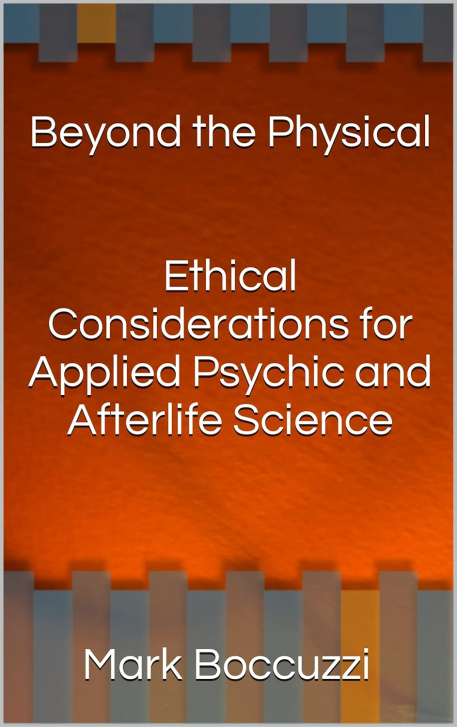
Reviewed by Nemo C. Mörck
Mark Boccuzzi presents himself as researcher, developer, maker, and activist: ”I have been working at the intersection of applied parapsychology, cutting-edge technology, and interactive media since 2000” (p. 157). As a child he was diagnosed with ”several learning disabilities, including dyslexia” (p. xiii), and this is why he has co-written books with ChatGPT, most recently Unlocked: How to Harness Your Psychic Abilities. He has also written Beyond the Physical: Ethical Considerations for Applied Psychic and Afterlife Science, which caught my interest.
Beyond the Physical is a curious book and appears to have received little attention. I am reviewing it here in honour of Damien F. Broderick (1944-2025), whose mind could have grappled with all the possibilities this book explores.
The book has not only been co-written with ChatGPT - Boccuzzi has also allowed it to review his work (ChatGPT, 2023). He notes that ”several human readers” provided feedback, but if you are familiar with ChatGPT and similar programmes, you will recognise the writing style. Boccuzzi has attempted to fact-check, but there is, in fact, little to check. The book is formatted to accommodate his needs and that means large print and generous line spacing. The book: ”... is not meant to be academic, I have forgone formal citations and references in favor of providing a list of resources” (p. xv). The resources include a list of books and a list of organisations.
The book presents only fictional examples of psi applications, which I find unfortunate. The webcomic xkcd captured sceptics’ beliefs in a strip ”The Economic Argument” yet during the existence of the Star Gate programme, intelligence agencies kept tasking remote viewers, and occasionally there are reports of successful psi applications (e.g., Kolodziejzyk, 2012). All examples in the book are fictional, but Helmut Schmidt’s dislike of cockroaches, An Antidote to Violence (Spivack & Saunders, 2020), and the Global Consciousness Project may have served as inspiration.
Psychic abilities have appeared in many novels and movies (Broderick, 2018) that could have served as material for discussion. More importantly, the lack of explicit references to the literature on psi applications (e.g., see Radin, 2020) makes the book stand apart rather than connecting to relevant publications (e.g., Reichbart, 2019, pp. 192-200), research, or ongoing projects. However, Boccuzzi modestly only wishes ”to stimulate discussion and debate” (p. 15) and the book is certainly thought-provoking and sometimes amusing.
… this book starts with the premise that psi and survival [after bodily death] are real, albeit not fully understood, phenomena and have been integrated into the mainstream scientific worldview (p. 19, bold in original).
Boccuzzi suggests that this would raise concerns about consent and privacy. He further proposes that there may be a need for “strict rules and regulations governing the use of these [psychic] abilities” (p. 22). However, how would one ensure that people are not using psychic abilities without permission? The kind of telepathy that Boccuzzi has in mind could be used for insider trading, but how do you prove that someone read your thoughts?
If Carpenter (2012) is correct then we all unconsciously utilise psi, and many spontaneous cases seem unwanted by both the presumed agent and the percipient. Psychics also seem to have limited control. As far as we know, psychic ability is not something that can be turned on and off, but perhaps it can be enhanced or diminished (e.g., Freedman et al., 2024).
… the unpredictable nature of spontaneous psi events can make it difficult to obtain informed consent retroactively … (p. 26).
… it may be important to conduct targeted research on the potential risks and benefits of spontaneous psi experiences ... (p. 27).
Boccuzzi suggests that psychics involved in healthcare would need to undergo “rigorous training and certification” (p. 23). In contrast to Mark Edward and Susan Gerbic who refer to mediums as “grief vampires” Boccuzzi suggests that they “… could provide comfort and closure to those who are grieving” (p. 31). All Windbridge Certified Research Mediums have undergone an eight-step screening and training procedure. Regarding psychics, he notes:
If only some individuals possess the ability to tap into their psychic abilities consistently and accurately this could create significant disparities between individuals and groups (p. 38).
This is reminiscent of the kind of reasoning that ChatGPT is fond of. I sometimes get the impression that if AI ever took over the world it might implement human cloning to get rid of all pesky differences between humans. Concerning widespread belief in survival after bodily death Boccuzzi suggests that it could impact end-of-life care. Sceptics tend to dismiss belief in an afterlife as wishful thinking, but Boccuzzi remarks: “If consciousness survives after death then individuals may be held accountable for their actions in the afterlife” (p. 43). Reincarnation is mentioned only once, but is surely also something that needs to be considered in a book like this.
Precognition comes up several times in the book, but one of the more fundamental questions is never properly addressed: Namely whether psi can be “... used to predict and prevent natural disasters ...” (p. 53). Taylor (2020/2024) and Wargo (2018) suggest that the answer is no. However, to Boccuzzi everything is just thought experiments and he speculates freely.
He ponders the possibility that Artificial Intelligence (AI) could become psi-capable, and has devoted a chapter to this possibility. However, if ChatGPT gives us any clues about how AI would think then it is possible that it would just end up unable to do anything with psi due to its inability to gain informed consent from all people that it could somehow affect.
One of the primary ethical considerations of using psi-based interventions to decrease crime rates is the issue of informed consent (p. 93).
How would we tell who is in the affected area? Should we object to organised meditations for world peace? In addition, how would we ensure that everyone is “... fully aware of the potential risks and benefits of these interventions” (p. 93) since even future researchers are likely to be uncertain. In fact, I was surprised that fear is only mentioned once in the book.
In another hypothetical example Boccuzzi allows psychics to be utilised to locate oil and minerals, then he asks: “Since the information was part of the collective consciousness [really?] do gains need to be shared with the general public or other public service entities?” (p. 102).
Amusingly, in one scenario Boccuzzi writes “This raises concerns about the potential harm caused by altering the course of the future without the consent of those who will be affected” (p. 114). We all do this by being alive.
Boccuzzi’s personal views emerge in an example in which the researchers need to consider recommending “a moratorium on animal psi research until more effective controls can be developed to address the issue of experimenter psi” (p. 119, cf. Boccuzzi, 2021).
Later, Boccuzzi writes about diversity, equity, and inclusion (DEI). It would perhaps help the parapsychology community more if he showed statistics or was more specific - he writes about underrepresented groups, without specifying. DEI in a book about ethics makes sense, yet is surprising given that the book is mainly speculations concerning implications and ethical concerns that arise if psychic abilities and survival after bodily death are accepted as real.
While these phenomena may offer great potential for positive impacts, they also have the potential for harm if used irresponsibly or without proper consideration of the consequences (p. 139).
I found this book rather engaging and it is certainly thought-provoking, but the influence of ChatGPT is evident. Boccuzzi has not allowed himself to be bogged down by what seems reasonable to conclude today – he has allowed his mind to roam and prompted ChatGPT - allowing it to ponder on unrealised possibilities. The book may well spark discussion and affect the future.
References
Boccuzzi, M. (2021). Rethinking non-human animal psi research. Psi Hacking. https://www.psihacking.com/posts/rethinking-non-human-animal-psi-research/
Broderick, D. (2018). Psience fiction: the paranormal in science fiction literature. McFarland.
Carpenter, J. C. (2012). First sight. ESP and parapsychology in everyday life. Rowman & Littlefield.
ChatGPT (2023). [Review of the book Beyond the physical: Ethical considerations for applied psychic and afterlife science, by Mark Boccuzzi]. CEAPAR https://www.ceapar.org/posts/review-btp-ethics/
Freedman, M., Binns, M. A., Meltzer, J. A., Hashimi, R., & Chen, R. (2024). Enhanced mind-matter interactions following rTMS induced frontal lobe inhibition. Cortex, 172, 222-233.
Kolodziejzyk, G. (2012). Greg Kolodziejzyk’s 13-year associative remote viewing experiment results. Journal of Parapsychology, 76(2), 327-368.
Radin, D. (2020). IONSX: Applications of psi. IONS. noetic.org/wp-content/uploads/2020/12/IONSx-Applications-of-Psi.pdf
Reichbart, R. (2019). The paranormal surrounds us. McFarland.
Spivack, B., & Saunders, P. A. (2020). An antidote to violence: Evaluating the evidence. Changemakers Books.
Taylor, J. (2024). Contact with the future: the astonishing power of intuition and precognition (rev. Ed.). Independently published. (Original work published 2020).
Wargo, E. (2018). Time loops. Anomalist Books.

